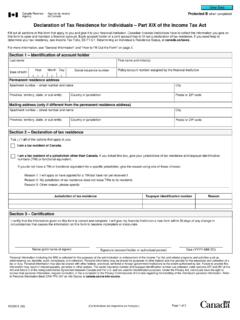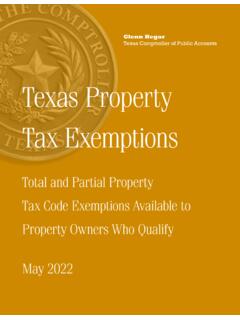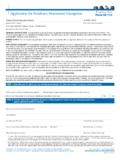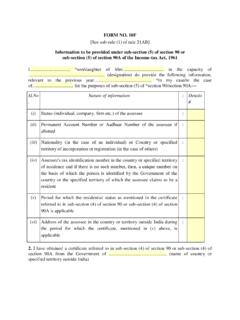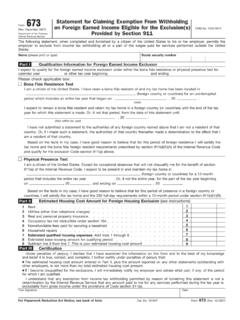Transcription of Instructions for Form 8898 (Rev. October 2021) - IRS tax forms
1 Userid: CPMS chema: instrxLeadpct: 100%Pt. size: Draft Ok to PrintAH XSL/XMLF ileid: .. ns/i8898/202210/a/xml/cycle03/source(Ini t. & Date) _____Page 1 of 5 16:48 - 20-Jul-2022 The type and rule above prints on all proofs including departmental reproduction proofs. MUST be removed before for form 8898(Rev. October 2022)Statement for Individuals Who Begin or EndBona Fide residence in a PossessionDepartment of the TreasuryInternal Revenue ServiceSection references are to the Internal Revenue Code unless otherwise DevelopmentsFor the latest information about developments related to form 8898 and its Instructions , such as legislation enacted after they were published, go to s NewLine 3a. We added new line 3a for the taxpayer s worldwide gross income for the tax year associated with the 3b. We moved line 3 to line InstructionsPurpose of FormUse form 8898 to notify the IRS that you became or ceased to be a bona fide resident of a possession in accordance with section 937(c).
2 See Bona Fide residence , later. For this purpose, the following are considered possessions: American Samoa, Guam, the Commonwealth of the Northern Mariana Islands (CNMI), the Commonwealth of Puerto Rico, and the Virgin Must FileYou must file form 8898 for the tax year in which you meet both of the following worldwide gross income (defined later) in that tax year is more than $75, meet one of the take a position for tax purposes that you became a bona fide resident of a possession after a tax year for which you filed a income tax return as a citizen or resident of the United States but not as a bona fide resident of the are a citizen or resident of the United States who takes the position for tax purposes that you ceased to be a bona fide resident of a possession after a tax year for which you filed an income tax return (with the IRS, the possession tax authorities, or both) as a bona fide resident of the take the position for tax purposes that you became a bona fide resident of Puerto Rico or American Samoa after a tax year for which you were required to file an income tax return as a bona fide resident of the Virgin Islands, Guam, or the figuring whether your worldwide gross income is more than $75,000, do not include any of your spouse's income.
3 If both you and your spouse are required to file form 8898, file a separate form 8898 for each of gross income. Worldwide gross income means all income you received in the form of money, goods, property, and services, including any income from sources outside the United States (even if you may exclude part or all of it) and before any deductions, credits, or 1. You are a citizen who moved to the CNMI in December 2021 but did not become a bona fide resident of that possession until the 2022 tax year. You must file form 8898 for the 2022 tax year if your worldwide gross income for that year is more than $75, and Where To FileFile form 8898 by the due date (including extensions) for filing form 1040. File the form by mailing it to the following Revenue Service3651 S. IH 35MS 4301 AUSCA ustin, TX 78741Do not file form 8898 with your tax return. Do not send your tax return to the address for NotFiling form 8898If you are required to file form 8898 for any tax year, and you fail to file it or do not include all the information required by the form or the form includes incorrect information, you may be subject to a penalty of $1,000, unless it is shown that such failure is due to CAUTION!
4 CAUTION!reasonable cause and not willful neglect. This is in addition to any criminal penalty that may be Fide ResidenceYou are a bona fide resident of a possession if you: Do not have a tax home outside the possession, Do not have a closer connection to the United States or to a foreign country than to the possession, and Meet the presence test (defined later).Special rule for members of the Armed Forces. If you are a member of the Armed Forces who qualified as a bona fide resident of the possession in an earlier tax year, your absence from that possession during the current tax year in compliance with military orders will not affect your status as a bona fide resident. Likewise, being in a possession solely in compliance with military orders will not qualify you as a bona fide resident of that rule for civilian spouse of active duty member of the Armed Forces. If you are the civilian spouse of an active duty service member, under the Military Spouses Residency Relief Act (MSRRA), you can choose to keep your prior residence or domicile for tax purposes (tax residence ) when accompanying the servicemember spouse, who is relocating under military orders, to a new military duty station in one of the 50 states, the District of Columbia, or a possession.
5 You and your spouse must have the same tax residence . If you choose to keep your prior tax residence after such a relocation, the source of income for services performed (for example, wages or self-employment) by you is considered to be (the jurisdiction of) the prior tax residence . As a result, the amount of income tax withholding (from form (s) W-2, Wage and Tax Statement) that you are able to claim on your federal return, as well as the need to file a state or possession return, may be affected. For more information, see: Notice 2010-30, available at #NOT-2010-30;Jul 20, 2022 Cat. No. 39789 WPage 2 of 5 Fileid: .. ns/i8898/202210/a/xml/cycle03/source16:4 8 - 20-Jul-2022 The type and rule above prints on all proofs including departmental reproduction proofs. MUST be removed before printing. Notice 2011-16, available at #NOT-2011-16; and Notice 2012-41, available at # can also consult with state, local, or possession tax authorities regarding your tax obligations under for theYear of the MoveAn exception applies to the tax home and the closer connection tests for the tax year you moved to or from the possession.
6 Under this exception, you satisfy the tax home and the closer connection tests for the tax year of the move if you meet the requirements explained , a special exception applies to the bona fide residence test for the tax year you moved from Puerto Rico. Under this exception, you satisfy the bona fide residence test for the part of the tax year you moved from Puerto Rico if you meet the requirements discussed later under Year of the move from Puerto Rico. If you qualify as a bona fide resident of Puerto Rico for the part of the tax year before the date you moved from Puerto Rico, you ceased to be a bona fide resident of Puerto Rico in the tax year that you moved from Puerto 2. You are a citizen who moved from Puerto Rico to Florida in May 2022 and meet the requirements to qualify as a bona fide resident of Puerto Rico for the part of the tax year before the date you moved from Puerto Rico. You must file form 8898 for the 2022 tax year if your worldwide gross income for that year is more than $75, of the move to the possession.
7 You satisfy the tax home and closer connection tests for the tax year you moved to the possession if you meet all of the following. You were not a bona fide resident of the possession in any of the 3 tax years immediately preceding the tax year of the move. You did not have a tax home outside the possession or a closer connection to the United States or a foreign country than to the relevant possession during any part of the final 183 days of the tax year of the move. You are a bona fide resident of the possession for the 3 tax years immediately following the tax year of the you do not meet all of the above conditions, you do not meet the tax home and closer connection tests under this exception. Instead, you must meet the requirements explained later under Tax Home Test and Closer Connection of the move from the possession. You satisfy the tax home and closer connection tests for the tax year you moved from American Samoa, the CNMI, Guam, or the Virgin Islands if you meet all of the following.
8 You were a bona fide resident of the possession for the 3 tax years immediately preceding the tax year of the move. You did not have a tax home outside the possession or a closer connection to the United States or a foreign country than to the relevant possession during any part of the first 183 days of the tax year of the move. You are not a bona fide resident of the possession in any of the 3 tax years immediately following the tax year of the you do not meet all of the above conditions, you do not meet the tax home and closer connection tests under this exception. Instead, you must meet the requirements explained later under Tax Home Test and Closer Connection of the move from Puerto Rico. You qualify as a bona fide resident of Puerto Rico for the part of the tax year before the date you moved from Puerto Rico if you meet all of the following are a were a bona fide resident of Puerto Rico for at least 2 tax years immediately before the tax year of the the year of the move, to be a bona fide resident of Puerto Rico, to have a tax home in Puerto had a closer connection to Puerto Rico than to the United States or a foreign country during the part of the tax year before the date on which you ceased to have a tax home in Puerto you do not meet all of the above requirements, you are not a bona fide resident of Puerto Rico in the year of the move under this exception.
9 Instead, you must meet the requirements explained next under Tax Home Test, and Presence Test, Home TestUnder the tax home test, you generally cannot have a tax home outside the possession during any part of the tax year. Your tax home is your regular or main place of business, employment, or post of duty regardless of where you maintain your family home. If you do not have a regular or main place of business because of the nature of your work or because you are not engaged in a trade or business, then your tax home is the place where you regularly live. If you do not fit either of these categories, you are considered an itinerant and your tax home is wherever you rules for students and gov-ernment officials. Disregard the following days when determining whether you have a tax home outside the possession. Days you were temporarily in the United States as a student (see Student, later). Days you were in the United States serving as an elected representative of the possession, or serving full time as an elected or appointed official or employee of the government of the possession (or any of its political subdivisions).
10 Special rule for seafarers. You will not be considered to have a tax home outside the possession solely because you are employed on a ship or other seafaring vessel that is predominantly used in local and international waters. For this purpose, a vessel will be considered to be predominantly used in local and international waters if, during the tax year, the total amount of time it is used in international waters and in waters within 3 miles of the possession exceeds the total amount of time it is used in the territorial waters of the United States, another possession, or any foreign Connection TestYou meet the closer connection test if you do not have a closer connection to the United States or a foreign country than to the are considered to have a closer connection to a possession than to the United States or to a foreign country if you have maintained more significant contacts with the possession(s) than with the United States or foreign country.










